
Welcome to desmoinessnakes.com! I am David, a snake enthusiast living in Des Moines, IA. Many people don't know that Des Moines is in fact full of snakes! You just need to know where to find them - they can often be shy and elusive. Some Iowa snake species are more common outside of the city limits, in different parts of Polk County IA, but many types of snakes are indeed common in the more urban parts of Des Moines. This guide is meant to help educate you about the beautiful snakes of Des Moines, and to help you identify the most common snakes of Des Moines, as well as the venomous snakes of Des Moines that you should learn to recognize and avoid. If you want more detail, click here for my complete list of ALL snake species in Des Moines. Remember the following:
- Most snakes of Des Moines are harmless and don't want to encounter you
- Venomous snakes exist but are uncommon in Des Moines, Iowa
- Snakes eat rats and mice and are a valuable part of the Iowa ecosystem
- Never kill a snake - if you leave a snake alone, it will leave you alone.
Common Snake Species in Des Moines
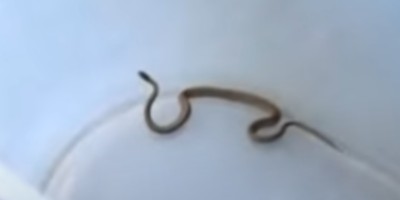 Brown Snake:
Unlike other entries in this list, brown snakes (Storeria) are a family of snakes. They have a remarkable distribution, from southern Canada, down into Central America. The main brown snake (S. dekayi) is a characteristic brown with a lighter central stripe. It grows no longer than 20 inches in length. These snakes feed on slugs, snails, and earthworms. They are non-venomous and are of no threat to humans. Some subspecies can even be held. However, they are sometimes mistaken for copperheads and so are killed.
Brown Snake:
Unlike other entries in this list, brown snakes (Storeria) are a family of snakes. They have a remarkable distribution, from southern Canada, down into Central America. The main brown snake (S. dekayi) is a characteristic brown with a lighter central stripe. It grows no longer than 20 inches in length. These snakes feed on slugs, snails, and earthworms. They are non-venomous and are of no threat to humans. Some subspecies can even be held. However, they are sometimes mistaken for copperheads and so are killed.
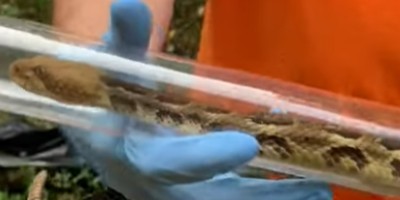 Eastern Garter Snake:
Eastern garter snakes (Thamnophis sirtalis sirtalis) are known for their three pale stripes: one in the mid back and two down the sides. Their bodies are slender and small, measuring around 18 to 26 inches. Being so little, they feed on earthworms, millipedes, spiders, and insects, as well as fish and amphibians. They are non-venomous but will attack if provoked. Nor is their bite harmless, as it can rarely cause an allergic reaction. You’ll find them near water, in urban lots, or slithering through suburban gardens.
Eastern Garter Snake:
Eastern garter snakes (Thamnophis sirtalis sirtalis) are known for their three pale stripes: one in the mid back and two down the sides. Their bodies are slender and small, measuring around 18 to 26 inches. Being so little, they feed on earthworms, millipedes, spiders, and insects, as well as fish and amphibians. They are non-venomous but will attack if provoked. Nor is their bite harmless, as it can rarely cause an allergic reaction. You’ll find them near water, in urban lots, or slithering through suburban gardens.
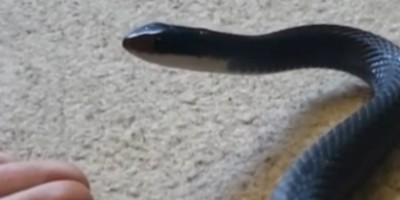 Eastern Racer:
As their name suggests, eastern racers (Coluber constrictor) are a fast-paced predator. They are common throughout the entirety of the US, in the east and the west. They have slender bodies, measuring 20 to 60 inches. Alternately, they are known as black racers, due to their dark coloring. However, their underbelly is typically pale. They hunt rodents, frogs, toads, lizards, and other snakes. They are non-venomous and do not constrict. Instead, they kill using their strong bite to suffocate prey. Similarly, if cornered, their bite is painful, and they will fight ferociously. They’ll also release a foul-smelling musk to ward off a would-be predator. You’ll find these tenacious snakes near water, in open grassland, or up in the trees.
Eastern Racer:
As their name suggests, eastern racers (Coluber constrictor) are a fast-paced predator. They are common throughout the entirety of the US, in the east and the west. They have slender bodies, measuring 20 to 60 inches. Alternately, they are known as black racers, due to their dark coloring. However, their underbelly is typically pale. They hunt rodents, frogs, toads, lizards, and other snakes. They are non-venomous and do not constrict. Instead, they kill using their strong bite to suffocate prey. Similarly, if cornered, their bite is painful, and they will fight ferociously. They’ll also release a foul-smelling musk to ward off a would-be predator. You’ll find these tenacious snakes near water, in open grassland, or up in the trees.
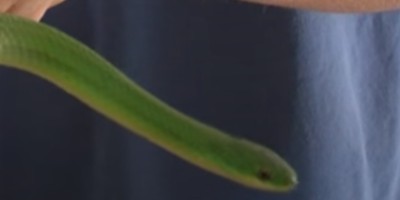 Smooth Green Snake:
Smooth green snakes (Opheodrys vernalis) are primarily found in a band stretching across the US-Canadian border and encompassing the Great Lakes. Due to their verdant color, they thrive in temperate grasslands, broadleaf forests, and wetlands. However, there are isolated pockets further south. At most, they measure 20 inches in length, although the longest smooth green snake was an impressive 26 inches. Their diet consists of insects and spiders, which they kill in the initial strike. These snakes rely on camouflage to hide from predators, and will seldom bite a human. They are also non-venomous.
Smooth Green Snake:
Smooth green snakes (Opheodrys vernalis) are primarily found in a band stretching across the US-Canadian border and encompassing the Great Lakes. Due to their verdant color, they thrive in temperate grasslands, broadleaf forests, and wetlands. However, there are isolated pockets further south. At most, they measure 20 inches in length, although the longest smooth green snake was an impressive 26 inches. Their diet consists of insects and spiders, which they kill in the initial strike. These snakes rely on camouflage to hide from predators, and will seldom bite a human. They are also non-venomous.
Venomous Snake Species in Des Moines
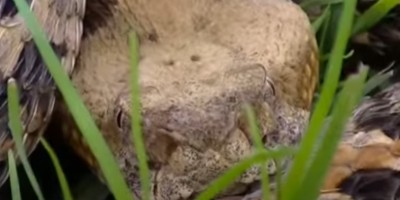 Timber Rattlesnake:
Timber rattlesnakes (Crotalus horridus), also known as the eastern rattlesnake, are found throughout the eastern US. As their name suggests, they prefer forests and woodlands and are skilled climbers—they’re grey in coloration, with dark chevrons running down their back and tail. In size, they measure between 2.5 to 5 feet in length – though reports up to 7 feet are not unknown. Primarily they feed on squirrels, rabbits, chipmunks, and other small mammals. They are venomous but will avoid biting humans if possible. However, if left untreated, bites have been known to kill. So, if you spot a timber rattlesnake, keep your distance.
Timber Rattlesnake:
Timber rattlesnakes (Crotalus horridus), also known as the eastern rattlesnake, are found throughout the eastern US. As their name suggests, they prefer forests and woodlands and are skilled climbers—they’re grey in coloration, with dark chevrons running down their back and tail. In size, they measure between 2.5 to 5 feet in length – though reports up to 7 feet are not unknown. Primarily they feed on squirrels, rabbits, chipmunks, and other small mammals. They are venomous but will avoid biting humans if possible. However, if left untreated, bites have been known to kill. So, if you spot a timber rattlesnake, keep your distance.
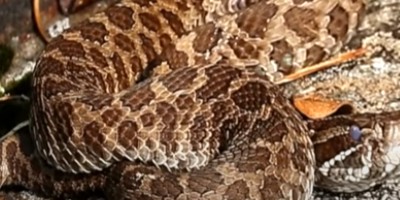 Massasauga Snake:
This rattlesnake is found in prairies, swamps, and woodlands, from the edge of Canada down to Arizona. The Massasauga (Sistrurus catenatus) grows to between 18 to 30 inches long and is venomous. However, typically, they are shy and secretive, avoiding conflict with humans if possible. Instead, they prefer to hunt frogs, lizards, and small mammals, such as rodents. Their venom is potent: breaking down cells and preventing blood clotting. Look out for their grey or tan bodies, with black and brown spots. However, pure melanistic or solid black massasauga snakes are not uncommon.
Massasauga Snake:
This rattlesnake is found in prairies, swamps, and woodlands, from the edge of Canada down to Arizona. The Massasauga (Sistrurus catenatus) grows to between 18 to 30 inches long and is venomous. However, typically, they are shy and secretive, avoiding conflict with humans if possible. Instead, they prefer to hunt frogs, lizards, and small mammals, such as rodents. Their venom is potent: breaking down cells and preventing blood clotting. Look out for their grey or tan bodies, with black and brown spots. However, pure melanistic or solid black massasauga snakes are not uncommon.
If you're unsure, you can email me a photo of the snake at info@desmoinessnakes.com and I will email you back with the snake's species. If you found a snake skin, read my Found a Skin? page, and you can email me a photo of the skin, and I'll identify the snake for you. If you need professional Des Moines snake removal help, click my Get Help page, or see the below website sponsor I found, who provides that service.
Remember, the term is not poisonous snakes of Des Moines, it's venomous snakes of Des Moines. Poison is generally something you eat, and venom is injected into you. That said, dangerous snakes are very rare in Des Moines. The few venomous snakes of Polk County are rarely seen. But they are commonly misidentified, so learn about all the snake species of Des Moines in order to correctly identify them. These snakes are usually also found in the surrounding towns of Ankeny, Altoona, Johnston, Polk City, Pleasant Hill, Bondurant, Windsor Heights, Alleman, Elkhart, Runnells, Saylorville, and the surrounding areas.
Read our article about:
Should I Call the Pest Control Company for My Snake Problem?
desmoinessnakes.com domain and hosting costs made possible by the generous support of this sponsor:
